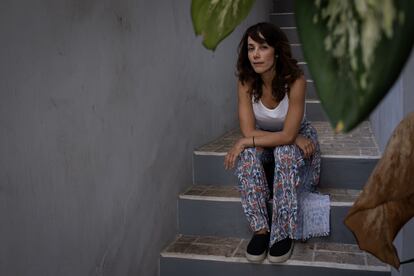Regretful mothers: ‘If I could go back, I would not get pregnant’
They hate motherhood, but love their kids. Stigma weighs on women who have these feelings, at a time of continuing idealization of, and social pressure on, female parents

Karla Tenório, a 40-year-old Brazilian, was already regretting motherhood during childbirth, “when my daughter’s head came out of me.” She defines this moment, which took place during complications, as “a shock” and says that “it’s possible to love your daughter and lament being a mother at the same time” because, she explains, her conflict is with the burdens of motherhood and not with her 13-year-old daughter. At first, she felt like “a monster,” then she realized that what she was going through was an experience shared by others. 12% of mothers question their choice of having become one, according to the report Las Invisibles (in English, The invisible ones), put together by two Spanish organizations after surveying 94,000 women. The idealization of motherhood and social pressure influence this decision, which is not always easy to accommodate alongside one’s work and social life. Although her daughter is now the most important person in her life, Tenório is clear: “If I could go back, I would not get pregnant.”
Her words are echoed by the Barcelona residents 36-year-old Laura Cava and 38-year-old Ana, who prefers to not share her last name. The latter was surprised when she found out she was pregnant. “I had breast cancer and the doctors told me that it was practically impossible to gestate because of the treatments I had received,” she says. She decided to go ahead with it: “We were the only ones who were outside the typical family track.” She always heard that motherhood was the best thing that could happen to her, although she now disagrees. She confesses that she loves her little one-year-old son “madly,” but her feelings for him do not justify her new reality of “constant stress,” which she considers unhealthy.
Tenório decided to have her daughter because of “the preconceived notion of idealized motherhood.” She suffered from depression for nine years after the birth. “I became obsessed with perfect parenting, I wanted to do everything without delegating. I never rested and I began to lose my memory and the notion of time,” she says. Her memories of those moments are harsh: “It seemed like life was ending, as if a mother was being born and a woman was dying.” Today, she feels better, having built “a nice relationship” with her daughter. But if she could go back in time, she would not choose the path of motherhood. She believes her professional and personal life would benefit.
“I don’t like the routine of washing bottles and going to daycare,” Ana says. All the same, she always puts her best foot forward. Her self-demanding character makes it difficult for her to disconnect for even a second from her son. “You lose your identity a little bit, freedom doesn’t exist. It’s almost impossible to go to the bathroom alone,” she says. Laura Cava also regrets being a mother, but attaches great importance to the education of her little ones, aged six and eight. “I have to balance my personal frustration at making the wrong decision with the responsibility of wanting to do it right,” she says.
The manager of Madrid Psychologists, Montserrat Cabello, says that maternal regret is a reality that began to surface in consultation 10 years ago, but that the number of patients who come to the clinic because of the issue is increasing. She thinks that the situation has always been present, just that it was not visible before. Societal pressure to have children has stuck with us, she says. She also thinks that in the past, society did not demand so much from mothers. “Not only do they have to raise children, they have to develop personally and professionally. The tasks have multiplied,” she says.
Cava has had to put her professional aspirations on hold, which saddens her. The disparity in her and her partner’s salaries led her to reduce the number of hours she works to take care of her kids. When she was young, she had no desire to be a mother, but stability, coupled with her partner’s desire to be a father, led her to have two children. She realized she had regrets when the kids were no longer babies and she began to want to resume her previous life. She was unsuccessful in the attempt. Now, she is frustrated that society doesn’t support her in that mission: “You fight to go back to the way you were before, but you run up against many walls, and there’s the simultaneous demand of two children who need you.”
Cabello has also noticed in her practice that women now feel more alone in parenting, due to the fact that there used to be social structures that better supported mothers. “There was a tribe, kids were raised by everyone,” she says. In addition, although it’s often assumed that a couple will share the responsibilities of care, she says that’s not always what ends up happening. “There are people who know that they don’t want to be a single parent, but then they discover that what was going to be a shared project isn’t, because the contract is broken,” she says. In the psychologist’s eyes, social pressure, idealization and inequality often influence eventual regret: “Wait outside a school and compare the number of mothers and fathers who are picking up their children.”
When Tenório discovered that there were other people in her situation, in 2020 she created the Instagram account Mãe Arrependida (Regretful mother, in Portuguese), to promote her theatrical production that addressed the subject. Half of a year later, she posted about her opinion regarding motherhood on the page: “I was pilloried until many realized that I loved my daughter and a wave of empathy took place,” she says. She gained over 50,000 followers on the profile, and many of them also share their experiences. “Freeing a regretful mother is freeing a daughter,” she says. She means to desconstruct the myth of motherhood that, according to her, has been imposed upon us. “Coelho Neto, a Brazilian poet, wrote that to be a mother is to suffer in paradise. Would his wife, which whom he had 14 children, say the same thing?” she asks.

Cava confesses that motherhood did not complete her life, with which she was satisfied to begin with, but rather took away her independence. “Friday comes around and, many times, you don’t have the strength, even before you go to work you’re already working, and afterward you have to keep working until you go to sleep,” she says. Although she hates going to the park, she refuses to fill her children’s afternoons with extracurricular activities: “Why even have children? I don’t like the job of being a mother, but I’m going to try to give them a good life.”
The psychologist explains that at first, one might confuse postpartum depression with regret because their symptoms are similar: depression, anxiety, mood swings, fatigue, restlessness and social isolation. But, “the difference lies in a philosophical question: who am I and how do I want to position myself in the world?” she explains. The answer does not necessarily imply regret over being a mother.
Misunderstood women
These women feel misunderstood and persecuted by taboo. “I don’t like WhatsApp chats with the other parents from my kids’ school, or going out with friends just to talk about our kids. When I say that I want to go out, people laugh and think I’m joking, or they don’t know how to answer because they don’t usually talk about such things,” says Cava. In contrast, Ana is grateful for her partner’s unconditional support, but sometimes she is flooded with guilt over how sweet her son can be.
Cabello stresses the importance of letting these feelings go, because these women “are not selfish,” and they care about the children and love them. Moreover, she insists that regret should not dominate their lives, but that they should learn to manage it, building a customized motherhood that is not at the service of societal impositions.
The paradoxical ambivalence of hating motherhood and loving one’s child is possible for these women. They are mothers who face the present with a sense of responsibility, but if they could go back to the past, they would make another decision that, given their experience, they consider better suited to them. Tenório has already talked about this issue with her teenage daughter: “I told her that it was her mother’s problem with society, not her.”
— What was her response?
— Being a regretful mother is reality, but you love me and you take of me, so for me, they’re just words.
Sign up for our weekly newsletter to get more English-language news coverage from EL PAÍS USA Edition
Tu suscripción se está usando en otro dispositivo
¿Quieres añadir otro usuario a tu suscripción?
Si continúas leyendo en este dispositivo, no se podrá leer en el otro.
FlechaTu suscripción se está usando en otro dispositivo y solo puedes acceder a EL PAÍS desde un dispositivo a la vez.
Si quieres compartir tu cuenta, cambia tu suscripción a la modalidad Premium, así podrás añadir otro usuario. Cada uno accederá con su propia cuenta de email, lo que os permitirá personalizar vuestra experiencia en EL PAÍS.
¿Tienes una suscripción de empresa? Accede aquí para contratar más cuentas.
En el caso de no saber quién está usando tu cuenta, te recomendamos cambiar tu contraseña aquí.
Si decides continuar compartiendo tu cuenta, este mensaje se mostrará en tu dispositivo y en el de la otra persona que está usando tu cuenta de forma indefinida, afectando a tu experiencia de lectura. Puedes consultar aquí los términos y condiciones de la suscripción digital.









































